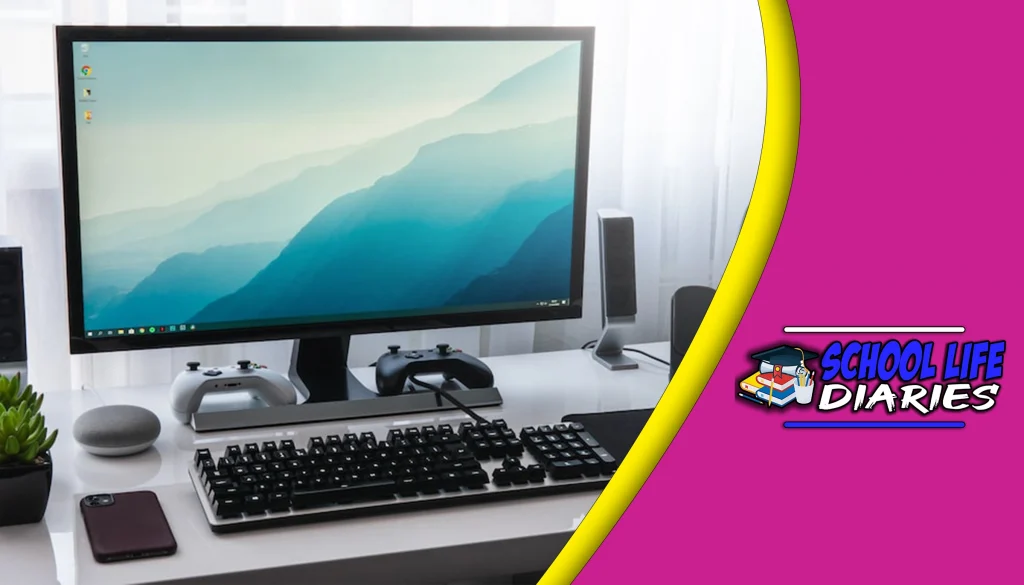Yes, you will likely need a desktop computer for college. While some colleges and universities are starting to offer more online course options, most classes will still require traditional in-person attendance. Many college students use their computers for research, writing papers, and other academic work.
Is a Desktop OK for College?
Yes, a desktop computer is absolutely fine for college, although most students will opt for a laptop due to its portability. Some others who enjoy games or are media junkies will find that they need the extra power that a desktop can provide.
Should I Get a New Computer for College?
Most schools expect students to have at least a basic computer that can access the internet. So, if you don’t already have one, chances are you’ll need to purchase a new system. However, what type of computer you should get really depends on your specific needs and what type of school you’re attending.
If you’re planning on doing a lot of heavy-duty computing like gaming, video editing, or programming then you’ll probably want to invest in a good laptop. But if you’re just using your computer for basic activities like emailing professors, surfing the web, and completing online assignments, then a desktop PC might be more than enough.
Do Desktops Last Longer Than Laptops?
Yes, the general consensus is that desktop computers last longer than laptops. A laptop’s lifespan is generally reckoned to be around three to five years, while a desktop computer’s lifespan is around five to eight years. However, this is not always the case in practice.
Many people find that they need to replace their laptops more often than their desktops due to the nature of how they are used. Laptops are often carried around and used in different places, which can lead to them being more prone to damage.
Should I Bring My Desktop to College?
No. If you have a desktop computer, there is no need to bring it to college with you. Laptops are more versatile and portable, so they are better suited for college life. However, if you really want to bring your desktop, make sure you have a way to transport it safely. If you’re planning to do a lot of coursework online or if your classes require a lot of software that only runs on Windows, you may need a laptop for college.
Can I Take My Gaming PC to College?
Yes, you can take your gaming PC to college with you. Just be sure to pack it in a sturdy carrying case so that it doesn’t get damaged in transit.
Also, keep in mind that each university has its own rules and guidelines about what students can bring. Gaming computers can get overheated. As a result, there is a chance that your university may see your gaming PC as a heating hazard and not let you bring it.
With that being said, you may want to consider leaving your gaming PC at home and just bringing a laptop. A laptop will be much easier to transport, and you won’t have to worry about it getting damaged or overheating.
Pros and Cons of Gaming Desktop
If you are looking for a computer specifically for gaming, then a desktop is the better option. Laptops are generally more expensive than desktops, and they tend to have lower specs when it comes to graphics and processing power. However, desktops are not as portable as laptops, and they can require more desk space.
The Pros of Gaming Desktop
- Price:
Gaming desktops are typically less expensive than gaming laptops. This is because the components that are necessary for gaming (namely, a powerful graphics card) are not as essential in other applications and can be left out of a desktop build to save on cost.
- Upgradeability:
Gaming desktops are also typically more upgradeable than gaming laptops. They have more open spaces inside them into which new components can be installed, as opposed to being tightly packed into a small form factor. This allows gamers to keep their machines current for longer periods of time.
- Performance :
A gaming desktop will have much better performance than a laptop when it comes to gaming or other intensive tasks. This is due to the fact that they typically have more powerful CPUs and GPUs, as well as more RAM.
- Monitor Size :
Laptops tend to have smaller monitors than desktops. This can be a disadvantage for gamers or people who need to do a lot of work on their computers. A gaming desktop will typically have a larger monitor, which can be more comfortable and productive.
- Customization and Modularity :
Gaming desktops are often more customizable and modular than laptops. This means that you can change the components on your desktop to better suit your needs, whereas with laptops you are often stuck with what you get.
The Cons of Gaming Desktop
Movement:
A desktop can be bulky and difficult to move around. If you’re looking for a computer that you can take with you to classes, a laptop is a way to go. However, if you plan on staying in one place most of the time, a desktop may be a better option for you.
- Battery Life:
A laptop would be a better choice in terms of battery timing if you need to do a lot of gaming. Many gaming desktops don’t have long battery lives, so you may find yourself constantly plugging it in to charge.
- Specifications:
A laptop will generally have better specs than a gaming desktop, but if you need the power of a gaming desktop, then a laptop may not be the best option for you.
Is a Mac or PC Better for College?
A Mac is better if you need to do a lot of creative work, such as graphics or video editing. A PC is better if you need to do a lot of programming or gaming. If you just need to type papers and do research, either one is fine.
Pros of MAC for College:
- MACs are typically more expensive than PCs, but they offer a better user experience.
- MACs come with pre-installed software that is designed for students and professionals, such as Final Cut Pro and Logic Pro.
- MACs are typically more reliable and consistent than PCs.
- MACs come with a longer warranty than PCs.
- MACs have a better resale value than PCs.
Cons of MAC for College:
- The high price tag may be prohibitive for some students.
- Not all software is compatible with Macs, so users may need to purchase additional software.
- Macs can be more difficult to repair than PCs.
- The battery life on most Mac laptops is shorter than on PC laptops.
- Macs are not as widely used as PCs, so students may find it harder to find help or support if they encounter problems.
Pros of PC for College:
- PCs are typically less expensive than MACs.
- PCs offer more storage space than MACs.
- PCs have wider screens than MACs, making them better for productivity.
- PCs typically have longer battery lives than MACs.
- PCs can be hooked up to larger monitors and keyboards, making them more comfortable to use for extended periods of time.
Cons of PC for College:
- Sometimes, the parts in a PC aren’t as high quality as those in a Mac.
- Windows PCs can occasionally be less dependable than their Apple counterparts.
- Windows PCs are more likely to have issues with security.
- Running Apple OS programs on a PC is challenging.
What Are the Pros and Cons of a Desktop Computer?
The Advantages of a Desktop Computer
- A desktop computer is a powerful tool that can be used for many purposes, such as creating documents, browsing the internet, and playing games.
- Desktop computers usually have larger screens than laptops, which makes them ideal for watching movies or working on projects.
- They also come with a keyboard and mouse, which makes them great for typing and manipulating objects on the screen.
- Desktop computers are often more affordable than laptops, and they typically have more storage space.
- They can be easily upgraded with new hardware, software, and accessories.
- Desktop computers are perfect for multitasking since you can have multiple windows open at the same time.
- They’re also great for heavy-duty tasks like video editing and gaming.
- Desktop computers tend to run cooler than laptops, making them less prone to overheating.
- They come in a variety of shapes and sizes, so you can find one that’s perfect for your needs.
- Desktop computers are easy to use and customize, making them a great choice for people of all ages.
The Disadvantages of a Desktop Computer
- Desktop computers are often more expensive than laptop computers.
- Desktop computers require more space than laptop computers.
- Desktop computers can be more difficult to transport than laptop computers.
- Desktop computers typically use more energy than laptop computers.
- Desktop computers can be more difficult to upgrade than laptop computers.
- Desktop computers can be noisier than laptop computers.
- Desktop computers can be less portable than laptop computers.
- Desktop computers generate more heat than most laptops.
- The lifespan of a desktop computer is usually shorter than the lifespan of a laptop computer.
- Upgrading desktop components can be difficult, whereas laptop computers can often be upgraded with relative ease.
Conclusion: Desktop For College
Desktop computers are slowly becoming a thing of the past as laptops, tablets, and smartphones take over. While there are still some instances where having a desktop is necessary (like for gaming or graphic design), for the average college student a laptop will suffice.







